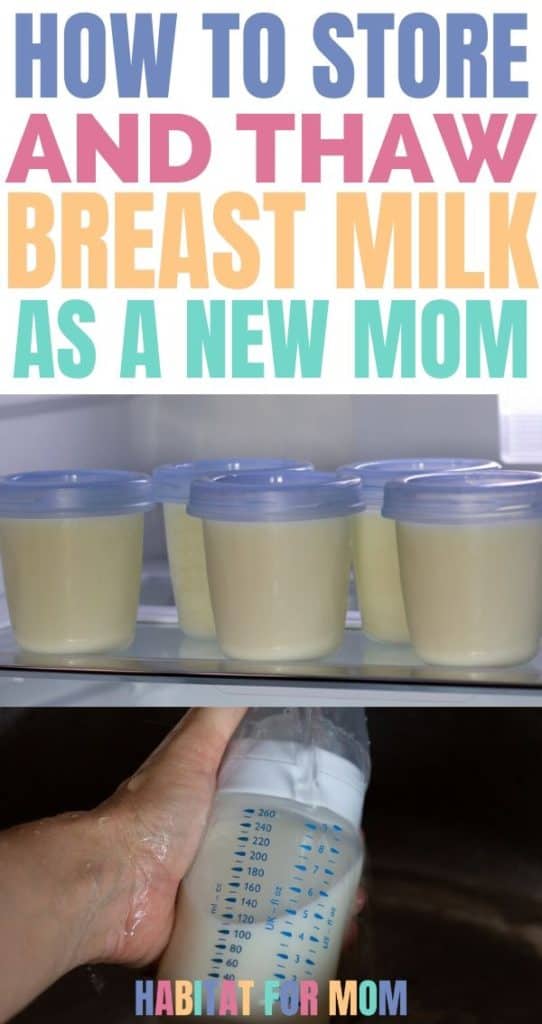This post contains affiliate links.
Storing and Thawing Breast milk

Being a first-time mom is incredibly daunting. Almost from the minute, the stick turns pink, you’re bombarded with advice and unsolicited opinions from all directions on the best way to care for your baby.
The benefits of breastfeeding for both mom and baby are well known. However, being the sole provider of your baby’s nutrition makes it feel like you’re shackled to your nursing station 24 hours a day.
Expressing and storing milk lets you regain some of your independence while ensuring your baby is still receiving all the nutrients they need.
Hello! My name is Jennifer and I am a mommy of one handsome little boy, and I love helping new and expectant mamas prepare for baby and stay happy and healthy during pregnancy and beyond.
If you don’t know where the heck to start when it comes to breastfeeding, especially storing and thawing and all the little details that come with it, I highly recommend the Milkology Exclusive Pumping Class or her Ultimate Breastfeeding Class.
Milkology’s breastfeeding classes are the most popular online today and they are well worth checking out, I took these classes and I learned SO MUCH.
How do I store breast milk?
There are several ways to store breast milk. The method you choose will depend on when you want to use it.
If you’re planning on using it within 4 to 6 hours then it can be kept in a sealed plastic or glass container at no more than 77F./25C.
To keep it for longer periods, it should be stored in either the refrigerator or freezer.
Refrigerating breast milk
You can refrigerate breast milk at temperatures of 39F/4C or colder to keep it for 3-5 days.
Refrigerate the milk as soon as possible after expressing it. Store it at the back of the fridge where it is coldest – don’t keep it in the door.
Freezing breast milk
You can keep breast milk in the freezer at temperatures of 0F/-18C or colder for 6-9 months.
Store the milk in the freezer as soon as possible after expressing it.
Don’t fill the container more than three-quarters full as the milk will expand in the freezer, and don’t use glass containers as they can crack at low temperatures.
Related: How to Build A Breast Milk Freezer Stash on Maternity Leave
What type of storage containers should I use?
You should store breast milk in clean BPA-free plastic bags or bottles.
Write the date you expressed the milk and the quantity on the container so you can easily see when it should be used.
Use the milk with the oldest date first. Storing milk in small amounts is better as you can reduce waste by using only what you need.
I love these breastmilk storage bags for the freezer. They are awesome for storing and labeling your breast milk so you can stay organized. You can check them out by clicking here.
Related: 4 Breastmilk Freezer Storage Hacks
How do I warm stored breast milk?
Refrigerated or frozen breast milk should be warmed up by putting the container in warm water at a maximum temperature of 99F or 37C.
Frozen milk can also be thawed by refrigerating it for 12 hours. Don’t defrost or heat milk in the microwave and do not refreeze previously thawed milk.
Breast milk storage on the go
If you’re heading out for the day or going to work, pack your breast milk in a cooler, along with some ice packs.
I find that the Lekebaby Breast Milk Cooler Bag with Ice Pack works great. Check it out by clicking here.
This will keep for up to a day.
Related: 7 Breastfeeding Station Essentials Every Mom Should Have Handy
Which breast milk storage method is best?
Only you can decide which storage method suits you and your baby.
Whichever method you choose, try and establish a routine early on to ensure you maintain your supply even if your schedule changes.
>>> If you have not checked out the breastfeeding classes you can find them all by clicking here <<<
If you have any concerns about breastfeeding or storing breast milk, always consult your lactation specialist.
If you found this article helpful please share it with a friend.
